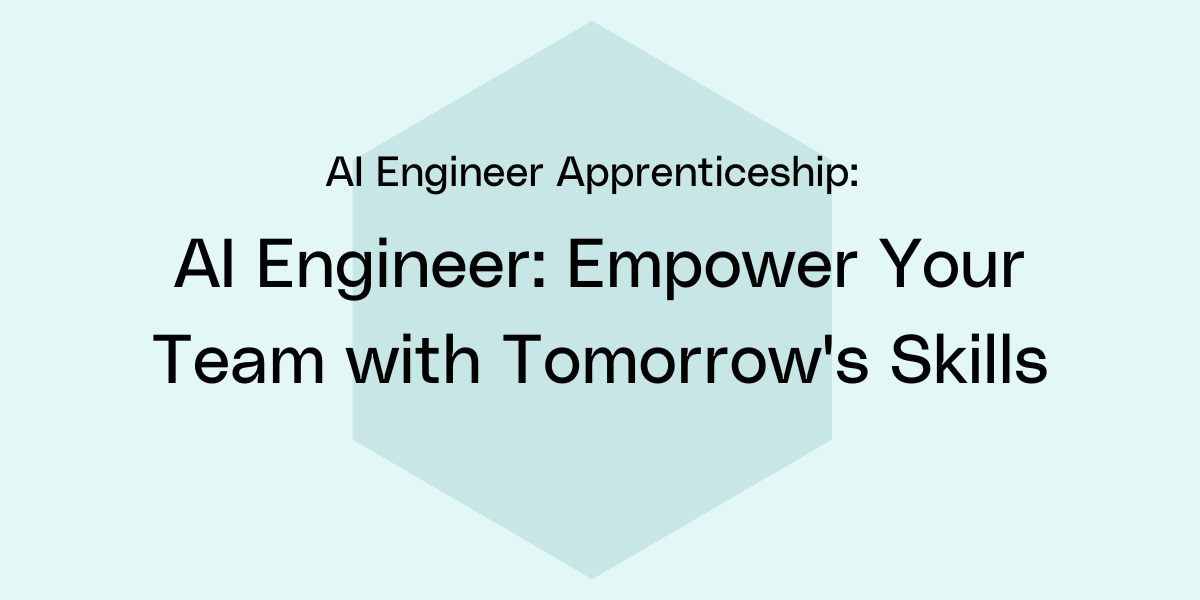The launch of ChatGPT bought artificial intelligence (AI) to the mainstream market. In just five days, the platform secured 1M users as people flocked to experiment with this ‘new’ technology. Globally, job postings related to AI and machine learning (ML) have increased by 65% as leaders realise the potential impact this technology could have on their organisation.
However, while AI offers a wealth of benefits, the reality is, knowing how to build products that fully leverage the technology requires specialist skills - and those are in short supply. According to industry data, ML engineers are the fourth most difficult role to hire for (behind software engineers, data engineers, and AI data scientists). Nearly three-quarters of organisations struggling to acquire the talent they need.
With AI and ML engineering skills in high demand, the alternative is to upskill your talent.
The best way to nurture AI engineering skills in your organisation
McKinsey warns that to succeed in the AI era, engineers need to extend their skills beyond technical competencies, to master broader “upstream skills”, which include writing user stories, developing code frameworks, understanding business outcomes, anticipating user intent, and communication.
Furthermore, it claims that current approaches to talent management have struggled to keep up with changes driven by digital capabilities. It advocates that
“HR leaders, working with CEOs and tech leadership, must instead transform how they find and nurture talent, with a focus on two areas in particular: strategic workforce planning and apprenticeship capabilities.”
Apprenticeships are a great way to nurture AI skills because the programme blends knowledge with 'on the job' practical skills, which helps learners to tackle specific challenges. These programmes allow learners to upskill alongside their current work commitments, applying their new competencies immediately to their job.
So what specialist skills are required for your AI engineers to successfully get the most out of your AI investments?
9 key skills for AI engineers
Setting the gold standard in data, analytics and AI training, Cambridge Spark is always first to market with recognised certifications and qualifications that help teams to develop new skills. We posed this question to some of our expert faculty of industry practitioners and academics, and compiled the following list of 9 key skills:
- Foundations of machine learning: understanding how to get the fundamentals in place, so organisations can prepare and enhance datasets for effective model development.
- Practical machine learning techniques: developing core skills in model testing, tuning, and validation – including tree-based methods and their ensembles.
- Product management: exploring the importance of stakeholder engagement, design thinking, and project management to ensure AI projects align with business outcomes.
- Neural networks and deep learning: learning how to build and optimise neural network architectures and knowing when to choose them over traditional machine learning methods.
- Explainability and interpretability: having the right techniques to communicate AI decisions transparently, as well as mitigate bias and ensure fairness.
- AI ethics and governance: enhancing processes to ensure ongoing compliance with data security, privacy, and industry standards.
- Generative AI and large language models (LLMs): studying the applications of GenAI and LLMs by exploring transformer models and natural language processing (NLP) techniques.
- Machine learning in production: transitioning prototypes to live environments by conducting feasibility studies, managing resources, and monitoring performance.
- Securing and optimising ML systems: addressing scalability and sustainability challenges to keep models robust and environmentally responsible.
A new path to expertise: AI Engineer (L6)
Cambridge Spark’s new AI Engineer Apprenticeship was developed to equip teams with the advanced skills needed to operationalise, build, and deploy production-ready AI systems.
This is delivered via live lectures to share the theory, workshops to put knowledge into practise, and self-paced e-learning – as well as access to our online learning platform, EDUKATE.AI, which uses real datasets in a sandbox environment to allow teams to practise their new skills and receive immediate feedback.
Cambridge Spark is the UK’s only specialist AI apprenticeship provider, and it’s that technical expertise that ensures we deliver high-quality education outcomes. For example, our pass rate is 99.5% with 70%+ distinction/merit grades, compared to an industry average of just 33%. And another apprenticeship in AI and Data Science (L7) has delivered significant business impact to our clients:
- £1.4m revenue identified through data-driven insights
- £120,000 saved by creating efficiencies
- 90% shorter project times achieved through automations
- 5x faster ML model training achieved through automations
Also, the programme is funded via the apprenticeship levy and assessed against the Level 6 Machine Learning Engineer Standard. It means your team can access high-value, cutting-edge training and be awarded recognised qualifications, but it comes at no additional cost to your organisation.
Find out more about AI Engineer Apprenticeships
To date, our apprenticeships have generated £350m+ in ROI for our clients and allowed them to gain a competitive edge. If you want to join them in staying ahead in an AI-driven landscape, discover what Cambridge Spark can do for you.





